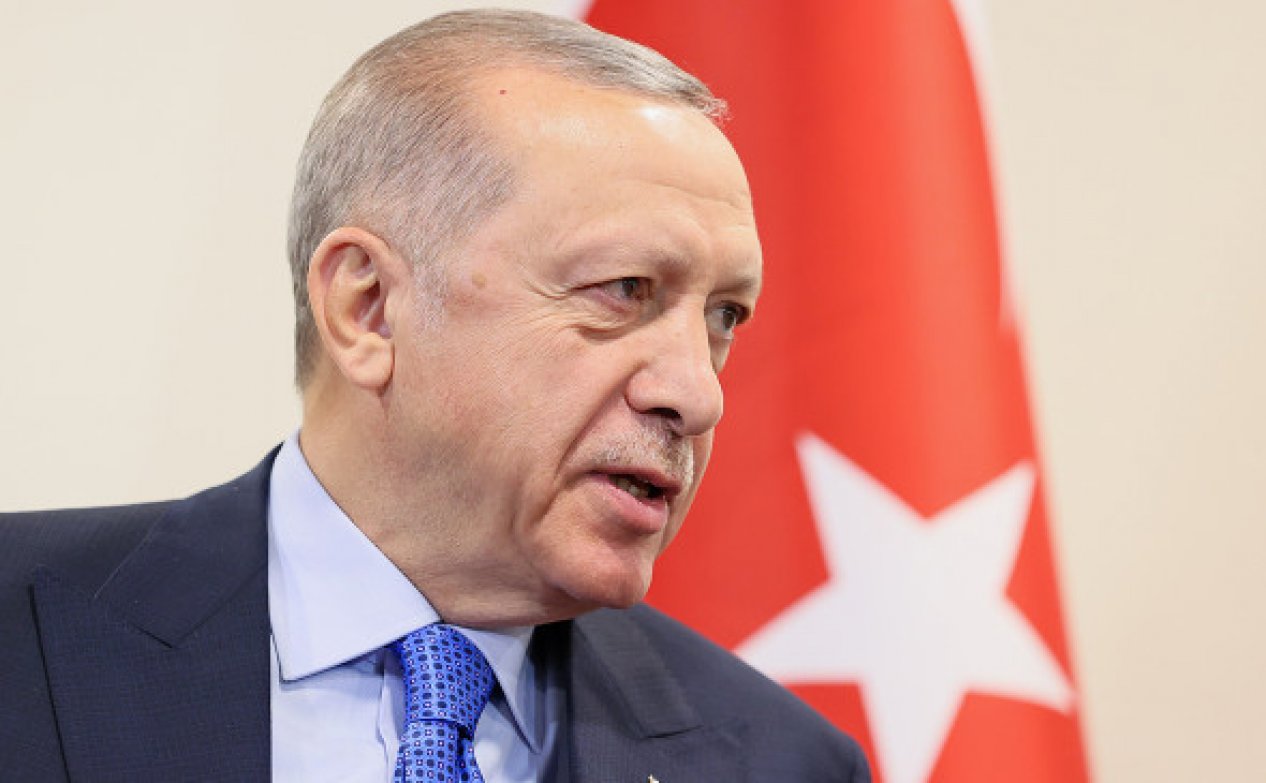
Turkish President Recep Tayyip Erdogan, in an interview with the Turkish television and radio company TRT, referred to the Armenian-Turkish relations and a telephone conversation with Armenian Prime Minister Nikol Pashinyan. “As part of two religious holidays, I had a conversation with Prime Minister Pashinyan, during which we exchanged mutual congratulations. Undoubtedly, we also talked about the ongoing process of normalizing relations between our country and Armenia,” Erdogan said.
He stressed that Azerbaijan was initially a red line for Turkey and that Ankara will open the borders only after Armenia resolves problems with Azerbaijan. “I was pleased when I heard that from the point of view of regional peace and cooperation, Prime Minister Pashinyan shares such thoughts with us. But we are already expecting from them, apart from words, concrete steps,” he said.
He noted that in the process of normalizing relations with Armenia, Turkey is serious and resolute and strives for a complete settlement and establishment of good neighborly relations.
Erdogan reminded about more than 100,000 Armenians living in Turkey: “At the moment, more than 100,000 Armenians live in Turkey, among which there are our citizens, and those who are not our citizens, but Armenians claiming citizenship. This demonstrates our approach.”
At the end, the Turkish president once again reminded that Ankara is coordinating its actions with Baku.
Despite that Erdogan’s statement was received with understanding by part of the Armenian authorities, it provoked a strong reaction from the opposition.
Faktyoxla Lab. has tried to find out why the statement of the head of Turkey caused such a reaction in the Armenian opposition.
Let’s start with the fact that, in all likelihood, the Armenian opposition (Kocharyan’s supporters, etc.) continues to live in a world of illusions. They still hope for something, build some mythical plans far from reality, and try to predict the future. Armenian politicians have repeatedly declared (both the new and the old leadership) their readiness to normalize relations with Turkey. But without preconditions. For some reason, they are upset that these statements still do not meet the "necessary understanding" from Turkey.
The situation in Armenian-Turkish relations has changed after 2020.
But what happened before that? In March 2018, then-President Serzh Sargsyan announced the denunciation of the protocols on the normalization of relations signed in Zurich.
However, after the change of power in Armenia, its new leadership, represented by Prime Minister Nikol Pashinyan, has repeatedly declared its readiness to normalize relations without preconditions. These statements did not meet the necessary understanding on the part of Turkey - the latter continued to insist on a solution to the Karabakh conflict.
In Armenia, they even offered to bring to their side those political forces and groups in Turkey that are most "infringed by Erdogan" and "to find many points of contact with these forces and groups."
That is, it was proposed to negotiate with Turkish groups, which at that time were aimed at undermining the state foundations of Turkey, and who do not like the growing power and authority of this country, and who believe that "another path of development" is destined for Turkey.
Fantastic assumptions were also voiced, for example, that "by normalizing relations with Armenia, Turkey can provide even greater support to the activities of the OSCE Minsk Group, and, as a result, to the solution of the Karabakh problem." True, the very mechanism of how Turkey was able to do this was incomprehensible.
Turkey, through officials, has always stated that the normalization of relations between it and Armenia is impossible until Armenia withdraws its troops from Azerbaijani lands. The Turkish side stated that it was ready to support any formula of Azerbaijan for the settlement of the Karabakh conflict.
Ankara has repeatedly expressed dissatisfaction with the fact that, firstly, this issue has already assumed the status of a frozen conflict, and has repeatedly stated that this situation needs to be changed. Secondly, the solution of this problem would strengthen the activities of Turkey itself in the South Caucasus, which in this case would turn into a region of stability and cooperation.
Now the settlement of the Karabakh issue has become the solution of several geopolitical problems in the region as a whole and concerning the Armenian-Turkish relations in particular.
But the problem is different. Even by opening the borders and establishing diplomatic relations with Armenia, Turkey's problems with this country will not end, but, on the contrary, they will move to another level. Armenia and the Armenian diaspora have a long list of claims against Turkey, which will be enough to get on Ankara's nerves for decades.
Most importantly, Yerevan will never demand that the Diaspora renounce the international recognition of the so-called “Armenian genocide” in the Ottoman Empire. In addition, this recognition is one of the components of Armenia's national security strategy.
Representatives of the Armenian diaspora have repeatedly stated that the international recognition of the "Armenian genocide" is only the beginning. They say that Turkish society, in turn, must also recognize this "historical fact." After the recognition of the "genocide", material compensation to the Armenian people should follow. By the way, a serious discussion about the amount to be demanded from Turkey as compensation for the "genocide" continues to this day.
In a word, even if the border opens, issues related to territorial claims to Turkey, historical digressions, prejudices of the international community and the strengthening of Turkophobia won’t disappear.
Finally, Armenia is well aware that the process of establishing Armenian-Turkish relations is impossible without taking into account the interests of Azerbaijan, which, considering the current geopolitical processes and development trends in the region, has developed and consistently implements a strategy that relies on the possibilities of its own space and geopolitical position and aimed at protecting own national interests.
As for Turkey, due to its geopolitical and geographical position, today it has become a world transit point for pumping and storing energy resources. Ankara is pursuing a systematic policy of strengthening in this direction, which is the basis of its entire strategy. Ankara has created a network of oil and gas pipelines passing through the South Caucasus transit region and Turkish territory and transporting Caspian oil to world markets.
The commissioning of the South Caucasus gas pipeline, cooperation with Russia in the implementation of long-term contracts for various gas pipelines is an indicator of Ankara's success in promoting its national interests as a transit power.
Of course, an indicator of Ankara's foreign policy success in the region is also the fact that, adhering to the principles of strategic partnership with respect to Georgia, Turkey was able to maintain its relations with such an important strategic trading partner as Russia, while also preserving and strengthening own positions.
In addition, the content and direction of Turkey's foreign policy is still associated with the country's membership in NATO, the development of its comprehensive ties with the West, the desire of the Turkish political leadership to ensure the strengthening of the country's role and influence on the southern flank of the North Atlantic Alliance, in the regions of the Near and Middle East, in Balkans, as well as in the states of the South Caucasus and Central Asia. The main goal of Turkey's foreign policy is to implement strategic national interests, the main of which is the transformation of the country into one of the political and military leaders in the region of Southern Europe.
On the other hand, recently Turkey has been demonstrating its potential as a serious player in the international arena. Ankara is making every effort to continue to be considered a regional player or "crossroads" at which the problems of Europe, the Mediterranean, the Middle East and Central Asia are resolved.
Here is the most important thing. An analysis of the developments in the region and in the world at the current stage suggests that Azerbaijan, in order to ensure all aspects of its national security, taking into account the strengthening of its regional significance, is pursuing an active offensive foreign policy.
This policy, along with maintaining a strategic partnership with Turkey, implies multifaceted cooperation both with neighboring states and with the US and the EU.
Azerbaijan today is a country with a stable socio-political system of governance, and the internal stability prevailing in the country is a very important factor that enables it to integrate in the future into any economic, military-political space that Baku considers the most acceptable option for ensuring security.
Azerbaijan's security guarantees its rapid development, and relations with the country are built on the basis of their geopolitical importance and successful policies.




















